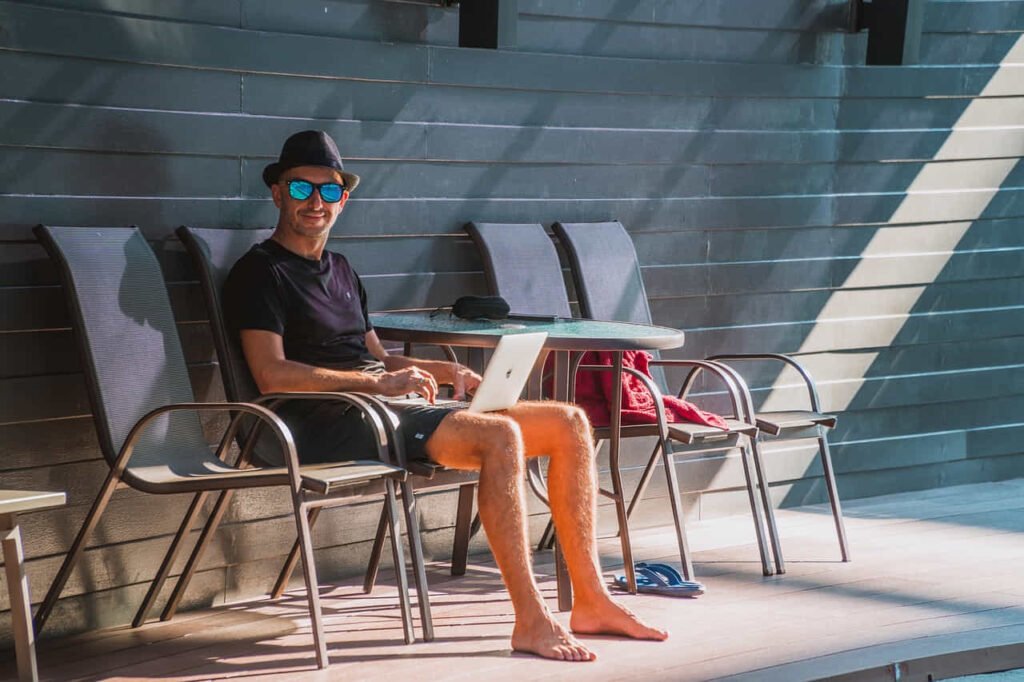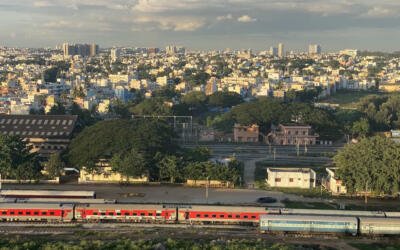According to a survey conducted in 2022 by McKinsey, a global management consulting firm, and market research firm Ipsos, up to 30% of Americans do or have the opportunity to work full-time remotely. That means they do not have to report to a physical office.
Indeed, with time it is becoming possible for most tasks to be assigned and done remotely. While some remote workers are employed, the vast majority are freelancers. Meanwhile, this is a trend that replicates across the globe.
A major result of individuals being able to work remotely is that they don’t have to have a fixed home. They also don’t have to be in the same country as their employers or clients. That creates the opportunity for one to travel the world while still working.

Before the internet, the only way one could perpetually travel the world was to first work, save enough and retire.
Indeed, digitizing work has allowed humans to resort to nomadism, a lifestyle common in many societies before the industrial revolution. According to some reports, about 17 million Americans describe themselves as digital nomads.
Merriam-Webster defined a digital nomad as ‘someone who performs their occupation entirely over the Internet while traveling.’
If this lifestyle attracts you, this is the ultimate digital nomad guide for you to kickstart your journey. In this post, I unveil essential skills, habits, tools, and resources to empower you to embrace this captivating lifestyle. If you’re drawn to the digital nomad lifestyle, this is your go-to resource for getting started.
Things you need to do
Learn to carry lean

Being a digital nomad means you are always on the move. It means you must carry most of the essentials you need. You must find ways to minimalize it. The goal is to make you a flexible traveler with small-sized luggage.
One way to achieve minimalist luggage is to pack clothes that easily match and complement one another. For example, several t-shirts matching one trouser will save space in your travel bag compared to having each t-shirt with its own accompanying trouser.
As a digital nomad, you will likely be into reading books. However, carrying physical books can easily become cumbersome in terms of space and weight. Besides, they may lead you to pay more for your transport.
Fortunately, thanks to technology, you can now carry as many books as you need without having to deal with space and weight issues. You can have your titles as ebooks on Kindle or audio files on Audible. Indeed, you don’t even need to buy a different device. You just need to download relevant apps on your smartphone.
Even maps can be accessed online. If you are in places where you cannot access the internet, you can use apps like Maps.me, which work even offline.
Another way to remain lean in your travel is to avoid collecting souvenirs unless it is really necessary. And if you must, you should have an address back home so that you immediately after acquiring them, ship them there.
Put your travel documents in order

Your travel documents must be to avoid finding yourself stranded in foreign cities or missing out on great destinations. In particular, ensure your passport is valid and always keep it secure and safe. Keep the document in a water-resistant pouch so it doesn’t get destroyed if exposed to the elements.
Also, make sure you do due diligence regarding the visa requirements of the places you intend to visit to avoid surprises on arrival.
Be mindful of the weather
The best way to protect yourself from the weather is to research the place you intend to visit and prepare yourself. For example, get whatever clothes you need in the new environment. If you are going to places with high sun exposure, pack some sunscreen lotion.
Things you should have
Drinking water purifier
Unfortunately, not every place you go will have safe water for drinking. In many destinations, it is highly likely to drink water with bacteria that can give you diseases like cholera and dysentery. You might rely on bottled water, but that can be expensive, you might not be where you can easily buy it, or in some instances, even the bottled water turns out to be contaminated.
You should get a reusable water bottle and then also get yourself a portable water purifier. Some UV light water purifiers are as small as a pen and easy to recharge. Every time you fill your bottle, you can use this gadget to kill any bacteria in the water.
Flashlight
Not every destination you visit will have reliable electricity. You might also need to light your path if you find yourself outside at night, or the electricity in the place you are staying might fail. Because of these likelihoods, having a small flashlight is advisable.
Backpack
This you need to carry the items. Ideally, the backpack must accommodate every essential and can easily be carried on your body.
Travel pillow
You will often find yourself in uncomfortable seats and beds as you travel. Having a pillow can help you protect your neck from injury while sleeping.
Power bank
Most places you find yourself might not have reliable electricity, or you might not have the opportunity to charge your phone as often as you might need. A power bank can save you from being offline when you shouldn’t.
Laptop
As a digital nomad, your laptop is your office. An ideal laptop for a digital nomad is small in physical size but with the necessary computing power. With some kinds of jobs, your smartphone might be all that you need.
Insects repellent
In most countries, you are likely to find yourself exposed to bugs and insects. Some of these might infect you with serious diseases. Mosquitoes, for example, spread malaria, Zika virus, dengue fever, and chikungunya virus. It helps to carry a repellent that you can apply on your skin when in environments that expose you to such animals.
Wipes and dry shampoo
In most countries, you will have access to running water; therefore, you can shower with little trouble. However, you are likely to run into some that have water shortages. You might occasionally not have running water in the shower. You should be prepared for such situations with wipes and dry shampoo for your air.
Universal power adapter
It is still the case that countries do not share standards for electronic use, especially in terms of telecommunication, voltage, and adapter designs. If you are not prepared for this fact, you might accumulate cables and adapters, which increases the amount of luggage you carry but also becomes costly over time. Getting a universal adapter makes it easy to use power in most countries you visit.
Camera
You might need to take images, and you might also need to take videos either for your own records or as part of your work. Having a high-quality image camera is important. However, you don’t have to carry a big camera if you are a professional photographer. Often a good smartphone is enough.
The online resources you need as a digital nomad
Besides the items you need to carry with you and the new habits you need to acquire, you also need a few online resources to make your digital nomadism more efficient and fulfilling.
The list of categories includes the following:
Digital Nomad Community platforms
These online platforms allow you to interact and share experiences with other digital nomads. Such interactions can be a source of advice, especially regarding specific destinations. You can also get inspiration from others to make your own experience even better. Such platforms include Digita Nomad Worlds, Dynamite Circle, and Nomad List.
Flight booking
Since you are likely to be traveling by air mostly, you must identify some of the online tools that can help you find the best ticket deals and also help you with the process of booking your flights. The tools you can use for this purpose include Skyscanner, Booking.com, CheapAir, and Kayak.
Accommodation booking
As a digital nomad, where you will stay is of primary concern, just like with other travelers. It is important to be able to pick a secure place with critical services such as restaurants and gyms nearby. You may also want your accommodation to provide office services and expose you to other digital nomads.
Online booking tools make the process of finding the ideal place easy. The tools you can use for this purpose include Airbnb, CouchSurfing, and Booking.
Co-working space
Co-working spaces offer the necessary facilities to deliver on your clients’ tasks. This includes reliable internet connection, desks, and even conference rooms. The co-working spaces are also where you can easily network to get more jobs or subcontract to ot her digital nomads.
Some online platforms that help you identify local co-working and co-living spaces include WeWork, Regus, and Workbar.
Transportation
While in local cities and towns, you can use the metro, train, and other public transport options. You can also get contacts of local taxi companies and call for one whenever you want to move about.
However, taxi-hailing apps are becoming the most convenient way to travel within cities. Uber and Bolt are, in particular, available in many cities around the world. One of the advantages of using these apps is that you don’t need to sign up every time you are in a new city. With that said, a few countries have their own local hailing apps.
In some cities, you will likely find apps that facilitate using other transport means, such as bicycle sharing. The purchase of metro and train tickets is also digitized in many cities.
Destination guides
There are many things you need to consider before choosing your next destination. There are tools online that can help you research destinations before you decide to go there.
One such tool is Nomad List. This is a paid-for service that provides different types of data about cities around the world. The data is tailored for digital nomads and includes security, internet speed, and cost of living.
When it comes to digital nomad destinations, the Clubswan blog is your go-to platform for gathering valuable information. Explore our comprehensive guides to popular cities favored by digital nomads. Discover essential details such as visa requirements, application processes, the cost of living, and safety.
Further reading
Job boards
Of course, as a digital nomad, you need a continuous supply of work even as you travel. That is where job boards come in handy. The list of job boards you can use include freelance websites such as Upwork and Fiverr. Other job boards you can use include those maintained by Nomad List and LinkedIn.
Payments
Crossing international borders regularly and getting work from clients anywhere on the globe often comes with the challenges of payment services. It is often the case that the payment service you are used to only works in some cities. It is also the case that local merchants accept payments through channels that you don’t have access to.
With that stated, there are several payment services that you can use to accept payments from clients from anywhere on the globe in your current location notwithstanding. PayPal and Wise are some such means of accepting international payments. You can also accept through wire transfers, which might make it difficult to access your funds in certain countries.
Bitcoin is more accessible as national boundaries do not constrain it. As long as you have access to the internet, you can receive and send crypto. While most merchants around the world do not accept crypto because of regulatory reasons, and lack of technical know-how, some processors facilitate spending crypto in most cities around the globe. An example of such a service is the Clubswan debit card. Once issued the card, you can spend your crypto anywhere where Visa and Mastercard debit cards are accepted.
Remote project management tools
As you travel and perform tasks for your clients, there are project management tools that are critical for your delivery.
For example, you may need to use slack or Trello to collaborate on tasks with other remote workers. You also need a tool like Calendly and Every Time Zone to harmonize different time zones, especially where different team members are located in different countries.
You can do it per task or hour when quantifying your output for payment. For the latter, you must use reliable tools to track time and secure the payment. Some tools you can use for this purpose include Clickup, Toggl, TimeCamp, and Time Doctor.
You can use Zoom, Microsoft Team, or Google Meet for conferencing and virtual meetings.
You might find yourself in a city where most people do not speak English, so you might need to use language translation tools such as Itranslate.
Club Swan Disclaimer: The information provided is not tax and/or legal advice. The statements do not constitute legally binding offers. The company does not guarantee or endorse any third-party links, websites, or goods and/or services. Seek your own professional advice.




